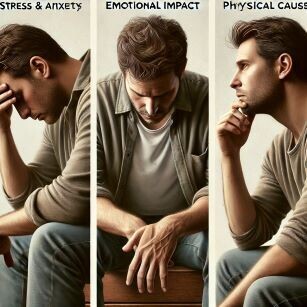Erectile dysfunction (ED) isn’t just a problem for older dudes anymore. A surprising number of men under 40 are dealing with it too. It’s like this secret that no one wants to talk about but is totally real. Increasing numbers suggest this isn’t just a fluke, indicating a broader issue that needs addressing.
Lifestyle might be playing a huge role here. Think about how we live these days—sitting around all day, scrolling away on our screens, only moving from the couch to the bed. This kind of routine does a number on our bodies and minds, potentially amping up the chances of ED. Healthy lifestyle choices seem less a priority, and that has its consequences.
But there’s more to it than just unhealthy habits. It’s important to get that ED isn’t solely a physical thing. Sure, blood flow problems can be a big part of the package, but mental factors like stress and anxiety are heavy hitters too. In young guys, it’s often a mix of the two. It’s like double trouble working from the inside out.
Understanding these dynamics is the first step to tackling the problem. Awareness is key, and recognizing the shift in the demographics of those facing ED could lead to better solutions. Our job here is to wrap our heads around why these changes are happening and to take proactive steps towards addressing them.
Physical Health Factors Contributing to ED in Young Men
When it comes to erectile dysfunction, what’s going on physically can’t be ignored. Let’s start by looking at our movement, or lack thereof. Sitting all day might not seem like a big deal but it’s slowing things down in more ways than one, affecting how our bodies function in crucial ways. Getting up and moving can keep things flowing as they should.
Smoking, drinking, and the occasional substance experiment may seem like typical young guy behavior, but these have some serious side effects. They don’t just affect the lungs or liver; they’re messing with circulation. Less circulation can mean issues in the bedroom.
Chronic health issues like hypertension, diabetes, and obesity are sneaking in earlier too. These conditions are linked to ED in a big way. Maintaining a healthy weight and keeping those blood sugar levels in check are more than just good health advice; they could help prevent ED.
Addressing these factors isn’t about gym memberships or crash diets. It’s about gradually integrating changes that fit into everyday life. Simple swaps and minor adjustments can make a big difference. Think less machine living and more just living.
The Mental Health Connection: Psychological Contributors to ED
It’s time to talk about the other side of the coin—mental health. Mind and body aren’t separate islands; they’re closely connected. For young men, stress is hitting hard. Work pressures, social expectations, and the constant digital buzz create a cocktail of stress that doesn’t just affect the mind—it’s affecting the bedroom too.
Then there’s performance anxiety, which feeds on itself. The fear of not being able to perform stands in the way of actually being able to perform, creating a loop that’s hard to break. It’s like self-sabotage fueled by the mind’s relentless overthinking.
Depression is another layer in this complex situation. It sneaks in quietly but carries a heavy load that can drag confidence and libido down with it. It’s not just about feeling low; it’s also about how much energy you have, both mentally and physically.
Addressing these issues often means opening up conversations and breaking down the stigma. Mental health affects everything, and tackling ED means tackling underlying stress, anxiety, and depression too. Seeking support, whether talking to a friend or a professional, is a game-changer. Prioritizing mental health can pay off in more ways than one, leading not only to improvement in ED but also to a better quality of life overall.
Taking Control: Prevention, Diagnosis, and Treatment
Early recognition of erectile dysfunction can make all the difference. Catching signs early and understanding them sets the stage for effective solutions. It’s not about self-diagnosing but acknowledging when something feels off and seeking guidance.
Making practical lifestyle changes might sound old school, but it’s never been more relevant. Introducing regular exercise and healthier eating habits works wonders. It’s more about consistency than perfection.
When lifestyle tweaks aren’t enough, it might be time to look at medical interventions. Medications are available, but so are options like therapy. Talking to a healthcare provider can uncover the best path forward tailored to individual needs.
No one-size-fits-all solution exists, so understanding what’s out there and what resonates personally is key. Whether it’s a focus on mindfulness or structured medical treatment, get informed and take charge. Facing the challenge head-on is empowering and can lead to meaningful changes.

